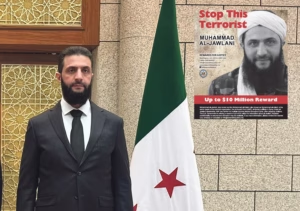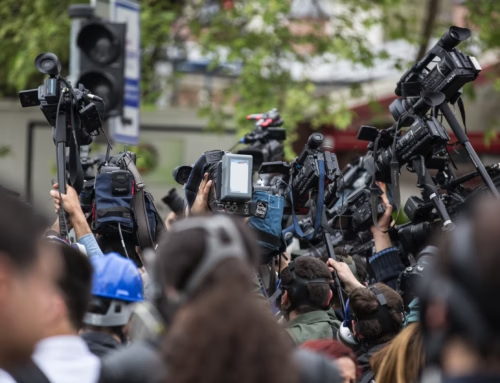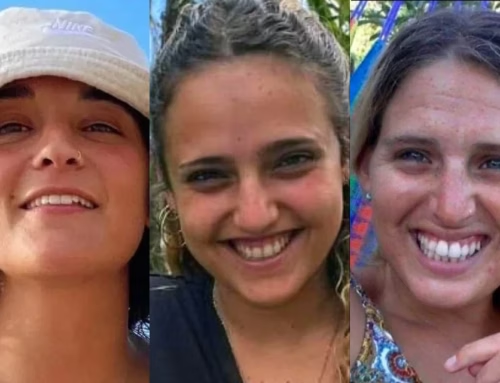Syria’s New Leader – with a background in al-Qaeda
Syria’s new leader has a background in the terrorist group responsible for the September 11, 2001, attacks on the United States. Saudi Arabia, Turkey, and Qatar are now pushing for his recognition as Syria’s legitimate leadership in order to lift the sanctions imposed by the United Nations.

Ahmed al-Sharaa was responsible for numerous “terror attacks across Syria, often targeting civilians,” according to the U.S. State Department. Now, he is Syria’s president—without any elections having been held. Photo: Ukraine’s Foreign Ministry
Syria’s Abu Mohammed Al-Golani, who changed his name to Ahmed al-Sharaa after the UN Security Council listed him as an al-Qaeda terrorist in 2013, met with Saudi Arabia’s Crown Prince Mohammed Bin Salman in early February on his first foreign trip as president. The Syrian leader visited Saudi Arabia to gain support for his “transitional government.” Al-Sharaa was accompanied in Riyadh by Syria’s newly appointed Foreign Minister Asaad al-Shaibani, one of the founders of al-Qaeda in Syria, where he operated under other aliases.
Ahmed Al-Sharaa overthrew longtime president Bashar al-Assad on December 8 with the help of Turkey, which also coordinated with Russia and Iran. Since then, the new Syrian administration has been trying to remove Western sanctions against Syria, as concerns over al-Sharaa’s previous membership in al-Qaeda have created uncertainty. According to the Turkey-based social media Clash report, most members of Syria’s transitional government have Turkish citizenship.
Saudi Arabia has been active in discussions with Europe and the United States to help lift economic sanctions on Syria. At the end of December, the U.S. withdrew the $10 million reward for information on Al-Golani, who, according to the U.S. State Department, was responsible for numerous “terror attacks across Syria, often targeting civilians.”
Invited by Macron
French President Emmanuel Macron was the first EU head of state to speak directly with Syria’s Ahmad al-Sharaa. Macron also invited al-Sharaa to Paris for the Syrian leader’s first visit to Europe. The EU has stated that it will ease some of the sanctions imposed on Syria to help the country rebuild after more than 13 years of civil war.
Russian President Vladimir Putin also spoke with Syria’s new leader, who ousted Moscow’s close ally Assad in December. A key issue is the future of Russia’s two military bases in the country.
During the phone conversation, al-Sharaa emphasized “the strong strategic ties between the two countries and Syria’s openness to all parties,” according to a statement from the Syrian presidential office.
According to Al Jazeera, Putin sent “an official invitation to Foreign Minister Asaad al-Shaibani to visit Russia.” Russia emphasized in a statement its “principled position in support of the unity, sovereignty, and territorial integrity of the Syrian state.”
Met with Erdogan
After his visit to Saudi Arabia, Syria’s new leader traveled to Turkey to meet with President Recep Tayyip Erdogan.
Together, they discussed “joint efforts for economic recovery, sustainable stability, and security,” said Erdogan’s spokesperson Fahrettin Altun before the meeting.
Qatar’s Emir Sheikh Tamim bin Hamad Al Thani visited Damascus at the end of January, becoming the first Arab leader to visit the country since Assad’s overthrow.
A few months before Assad fell and the new al-Qaeda-linked leaders took over Syria, new evidence was presented regarding the Saudi government’s involvement in al-Qaeda’s September 11, 2001, attacks.
The FBI identified Saudi intelligence officer Omar al-Bayoumi, according to Dagens Nyheter (DN).
Fifteen of the nineteen terrorists were Saudi citizens who managed to enter the U.S. due to their own efforts and authorities’ failures, according to DN, which describes how Omar al-Bayoumi had close ties to at least two of the terrorists, as well as to the influential terror propagandist Anwar al-Awlaki.
Video footage released last summer also shows two Saudi diplomats whom the FBI has linked to al-Qaeda.
UN Terror List
In July 2013, the UN Security Council’s committee added Abu Mohammed Al-Golani to the sanctions list established by Security Council Resolution 1822 (2008) against al-Qaeda and ISIS due to their terrorist acts that threatened international peace and security.
The sanctions included asset freezes, travel bans, and arms embargoes affecting all individuals and entities on the committee’s list.
Abu Mohammed al-Golani (spelled al-Jawlani in UN documents) was listed on July 24, 2013, due to his ties with al-Qaeda. The UN stated in its 2013 announcement:
“Abu Mohammed al-Jawlani is the leader of Al-Nusrah Front for the People of the Levant, a Syria-based terrorist group… In 2011, Abu Bakr al-Baghdadi instructed Abu Mohammed (the world’s most wanted terrorist, ed.) al-Jawlani to establish a front for al-Qaeda in Iraq in Syria by developing a local presence and fighting. Al-Qaeda in Iraq provided Jabhat al-Nusrah with manpower, money, weapons, and guidance.”


